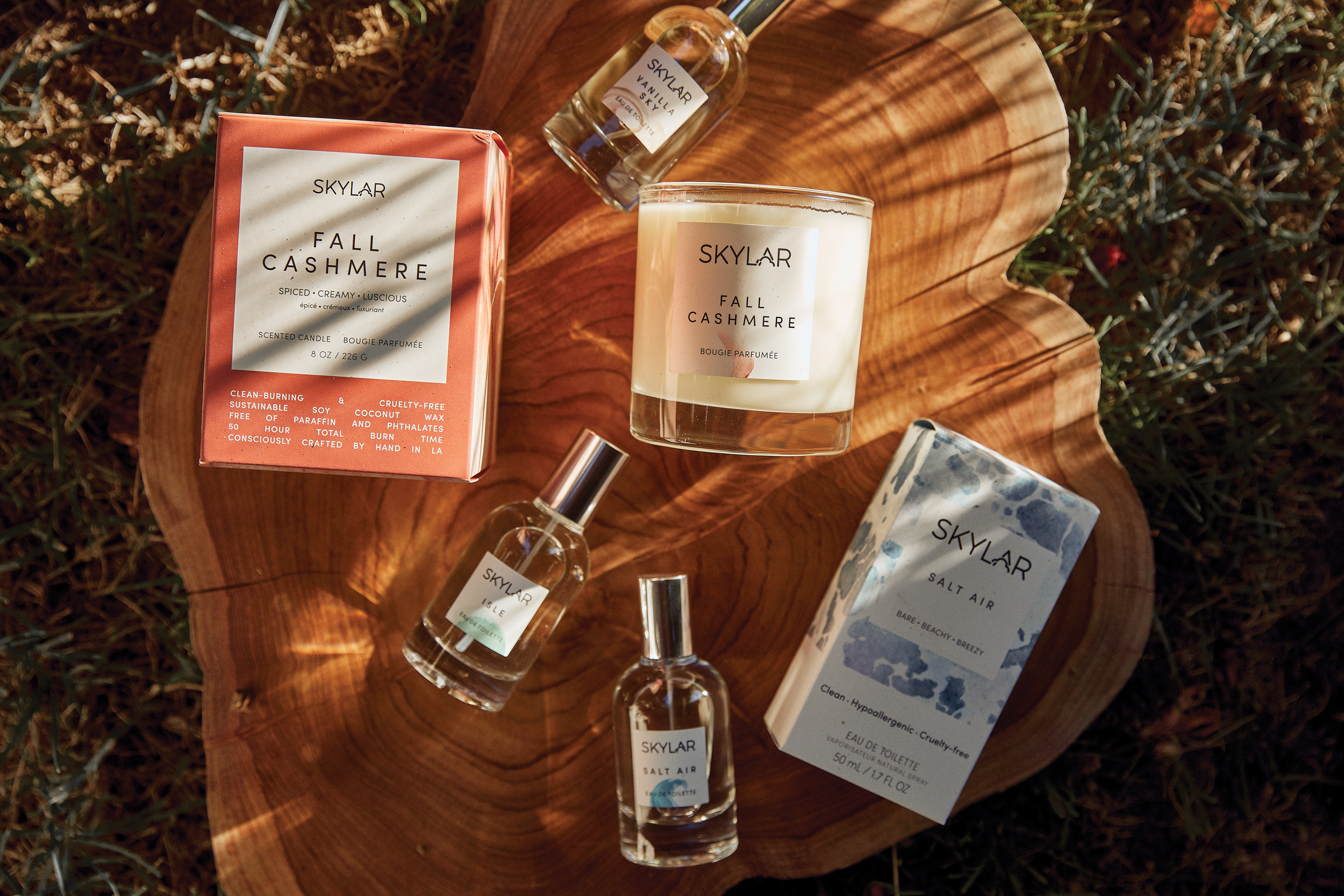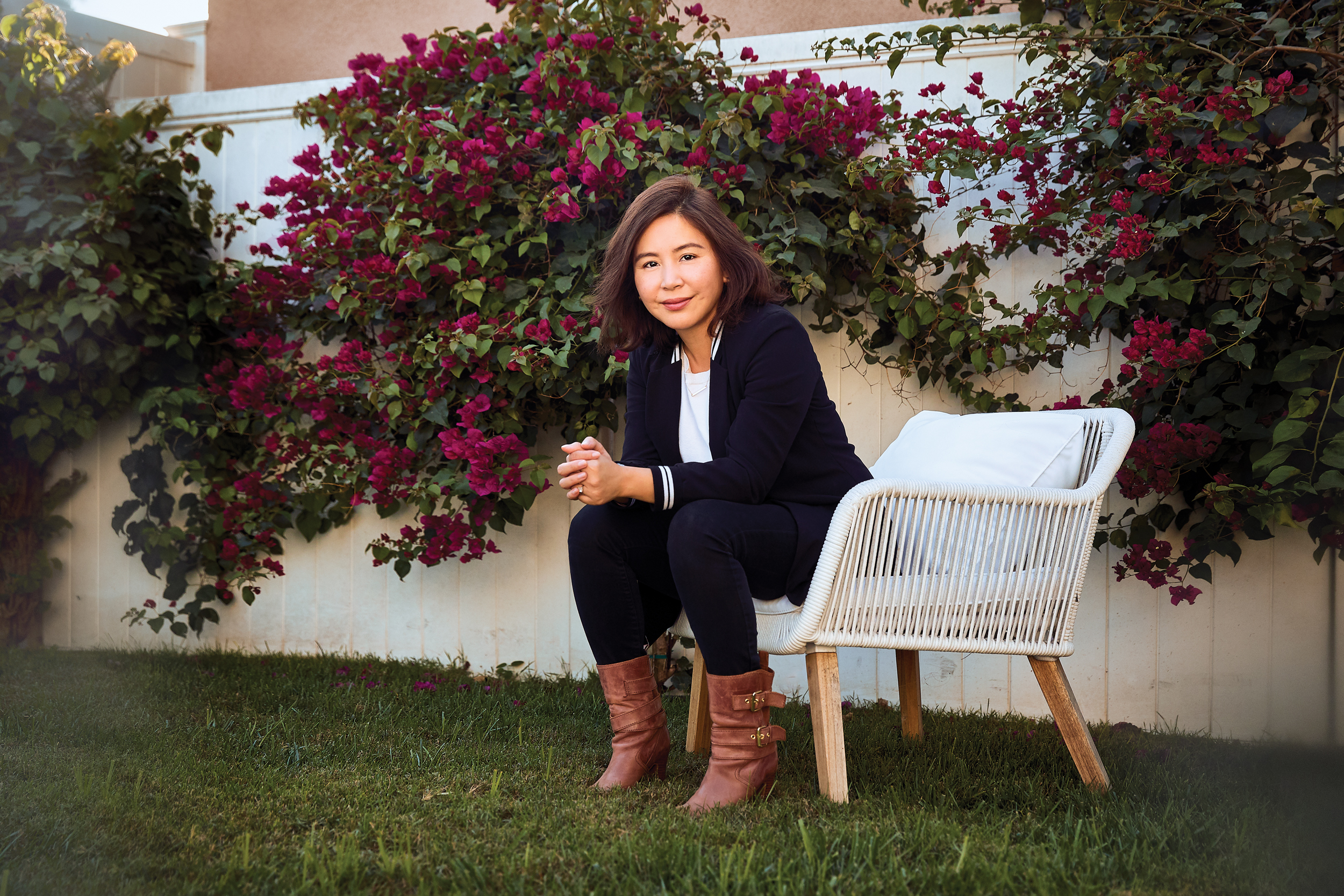Within six months of launching Skylar, the Los Angeles-based clean beauty brand, founder Cat Chen was thrilled when Sephora came calling. “We were still pretty small,” she says. “It was a stamp of validation that I was on the right path. Sephora always has been a trailblazer in the beauty retail space; they look into not only what has blown up, but what they think is about to blow up, and clean fragrance was one of those categories. They’ve been a great partner.”
“It was a stamp of validation that I was on the right path.”
Like the origin of so many great ideas, Chen created Skylar to solve a problem. She had loved experimenting with different beauty fragrances and lotions from a young age, but after starting her own family in Los Angeles, she discovered that her daughter couldn’t share her enthusiasm. “Everything I used on her was a clean product, but when I went back to work after my maternity leave, I started wearing my favorite perfumes again,” she remembers. “When I held her, she would have a physical reaction—her eyes would water, and she clearly was very uncomfortable. We quickly figured out that the scent I was wearing was the problem.”
Chen already was deeply immersed in the clean-product industry: She was VP of operations for The Honest Company, known for its clean household and baby-care products; the brand was founded in 2012 by actress and entrepreneur Jessica Alba, who had experienced similar issues with her own daughter, Honor. Chen’s awareness level of how to source clean products was already high as a result, but she saw that scents were not widely represented in the category. “And the few clean fragrances that were out there, they didn’t feel sophisticated to me,” she adds.
15% of consumers are allergic to scented products.

Diving into her own research, Chen soon learned that 15% of consumers are allergic to scented products, and mothers in particular told her a multitude of stories about discarding the perfumes they loved because their children also had experienced allergic reactions. “When you or someone you love goes through that, you become really diligent about reading labels,” Chen notes. “But an ingredient label on a fragrance can be purposely vague, because it’s a proprietary product. The more I learned, the more I wondered why someone wasn’t doing something, especially when scent is a $46 billion annual business, and most women wear perfume every single day.”
Working on her own and with perfumers, Chen hit upon a hybrid blend of natural and synthetic notes. “When I first started working on it, my plan was an all-natural line, but we ran into challenges,” she explains. “Some natural ingredients—lavender and grapefruit are good examples—are the biggest culprits for creating allergies, and other all-natural scents we created didn’t test well; women felt they smelled like a medicine cabinet.”
Chen ultimately was able to achieve the combination she was seeking—successful scents in hybrid formulas that were hypoallergenic, cruelty-free, and clean. In 2017 she launched Skylar as a direct-to-consumer concept. “I was quite a newbie in the beauty industry, but what I did know was e-commerce,” she says. “I also didn’t think that what we were doing would be explained well in a department store; some things happening in retail could be improved by digital, and we wanted to be very responsive to our customers’ feedback.”
Skylar launched with four fragrances, all inspired by nature as a nod to the ocean and desert lifestyle of southern California, Chen says. Isle, a water-inspired scent that Chen calls “dewy and light,” features notes of bergamot, cardamom, and sandalwood, and quickly became a bestseller. Today Skylar features nine fragrances, including the recently launched Vanilla Sky, as well as a collection of paraffin-free candles that debuted in late October. A hand sanitizer that launched earlier this year as a response to the COVID-19 pandemic also has vaulted to Skylar’s list of top-performing products—with 65 percent of consumers returning for a repeat purchase, Chen says it was an easy decision to add it to the permanent collection.
In 2019 Chen enhanced Skylar’s direct-to-consumer experience with Scent Club, a monthly subscription of fragrances to try in travel-friendly roll-on sizes. Club members rank their favorite scents in order of preference, and the most popular choices also could find their way into the permanent collection. A portion of the $20 monthly price, meanwhile, is donated to a different non-profit organization. That commitment to supporting a range of philanthropic efforts, from Black Lives Matter to Step Up, a non-profit mentoring program for high-school girls across the U.S., also has been central to the Skylar philosophy.

“We don’t really overthink it; we just think it’s the right thing to do,” Chen says. “I picked Step Up because I believe strongly in empowerment for women, and my experience is that there are still not enough women in leadership positions in business or in the investor world. We still need to do better.” Chen likewise is just getting started. Skylar’s philosophy also extends to sustainable, eco-friendly packaging, and earlier this year she redesigned the Scent Club’s monthly shipping box.
“Our subscription box was really beautiful, but it was overengineered, and our customers had to really take it apart to recycle it,” she explains. “By doing something more streamlined, we not only made it easier to recycle, we figured out that we were saving more than 20 tons of paper each year.”
“By doing something more streamlined, we not only made it easier to recycle, we figured out that we were saving more than 20 tons of paper each year.”
And make no mistake: Skylar’s fan base noticed. “When we first transitioned, we included a note in the new box, and the feedback was immediate,” Chen says. “Our customers are both very loyal and very opinionated, and we welcome those comments. Our Scent Club members also feel like they have a say in what we create, because they do. You can’t buy loyalty like that.”
With additional scents and products on the horizon, Chen is confident that Skylar’s business formula isn’t only forward-thinking, it’s also necessary to succeed in today’s retail landscape. “We make our choices not only because we believe in them, but because it’s clear our customers believe in them as well,” she says. “We don’t make decisions based on marketing. We make them because we know they’re the right thing to do.”